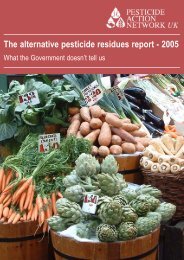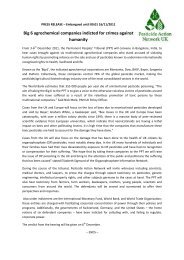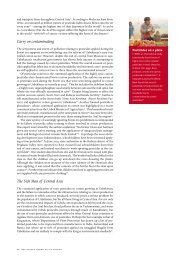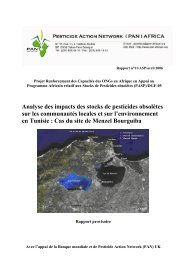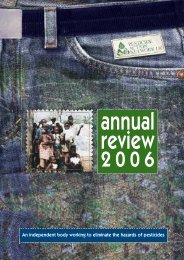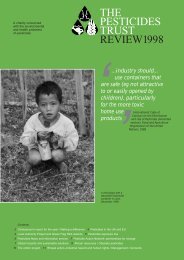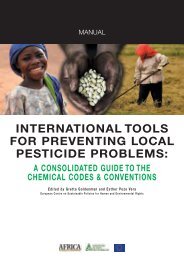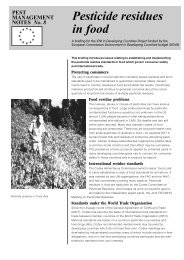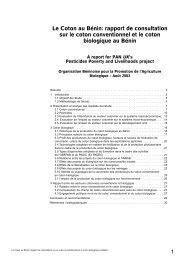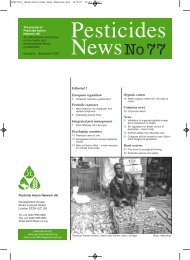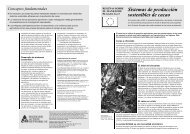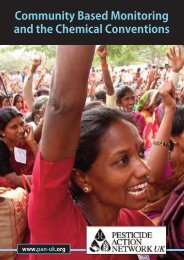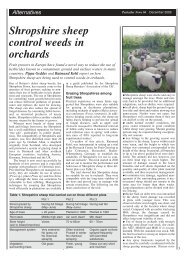Tanzania Multi Stakeholder Map - WebNG
Tanzania Multi Stakeholder Map - WebNG
Tanzania Multi Stakeholder Map - WebNG
You also want an ePaper? Increase the reach of your titles
YUMPU automatically turns print PDFs into web optimized ePapers that Google loves.
In recent decades, the risks posed by POPs have become of increasing<br />
concern in<br />
many countries, resulting in actions to protect human health and the<br />
environment being taken at the national, regional and international levels.<br />
1.3 The Stockholm Convention on POPs<br />
Chemical contamination of the environment shows no respect for territorial<br />
borders and therefore countries on their own, cannot respond effectively.<br />
In 1992, the United Nations Conference on Environment and Development<br />
in Rio de Janeiro agreed to address the problem of POPs. In May 1995<br />
the Governing Council of the United Nations Environment Programme<br />
(UNEP) requested in its decision 18/32 that an international assessment<br />
process be undertaken of an initial list of 12 POPs (Aldrin, Chlordane,<br />
DDT, Dieldrin, Polychlorinated para Dibenzodioxins - PCDD, Endrin,<br />
Polychlorinated Dibenzofurans - PCDF Hexachlorobenzene - HCB,<br />
Heptachlor, Mirex, Polychlorinated Biphenyls PCBs and Toxaphene) and<br />
that the Intergovernmental Forum on Chemical Safety (IFCS) develop<br />
recommendations on international action for consideration by the UNEP<br />
Governing Council and World Health Assembly no later than in 1997.<br />
In June 1996, the IFCS concluded that available information was sufficient<br />
to demonstrate the need for international action on the 12 POPs and that<br />
international action, including a global legally binding instrument, is<br />
required to reduce risks to human health and the environment arising from<br />
the release of the 12 POPs. The IFCS provided recommendations to<br />
UNEP that served as a basis for the mandate to begin negotiations of a<br />
global POPs Convention.<br />
In February 1997, the UNEP Governing Council in its Decision 19/13C<br />
invited UNEP to prepare for and convene an Intergovernmental<br />
Negotiating Committee (INC), with a mandate to prepare an international<br />
legally binding instrument for initially the 12 POPs and requested that the<br />
INC establish an expert group to develop criteria and a procedure for<br />
identifying additional POPs as candidates for future international action.<br />
The decision also included a number of immediate actions to address<br />
POPs issue. In June 1998, an Intergovernmental Negotiating Committee<br />
(INC) started to prepare for an international legally binding instrument for<br />
implementing international action on POPs. Five negotiation meetings<br />
took place and came to an end in December 2000. On May 23, 2001 a<br />
global, legally binding instrument called the “Stockholm Convention on<br />
Persistent Organic Pollutants (POPs)” was adopted in Stockholm Sweden.<br />
Ninety two (92) Governments and European Union adopted the<br />
Convention, <strong>Tanzania</strong> included.<br />
59




